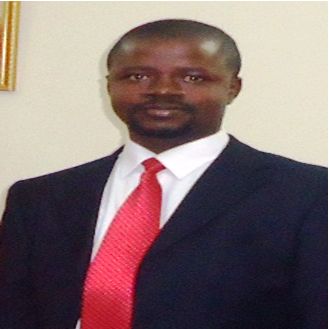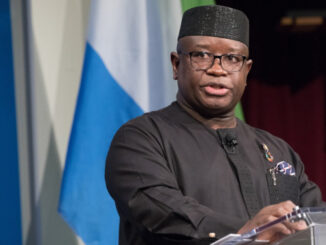A government that performs will always see her citizen asking for more. This is what is happening with the Koroma administration. In five years, following his election into office in 2007, President Ernest Koroma performed exemplary well, that there was the strong desire on the part of voters to reelect him, especially so when they came to know that the contents in the Agenda for Prosperity are as rich and promising as the commitment on the part of the President himself to move Sierra Leone to the apex of development. The energy sector, just as it is with other sectors, has always been part of the government’s strong success indicators.
Notwithstanding the few challenges we are faced with, the fact remains, there was a time, in the history of our energy sector when students even at the university will shout and dance on mountain tops, when they get a brief supply of electricity and those where the days when electricity will be supplied for just few hours and would only come after a month or so. So, no matter what one would want to say, today is far better than yesterday when it comes to electricity. The ‘Kabba (b) tigers’, have disappeared today. President Koroma has always believed in the need for an ideal energy environment. He knows with an ideal energy environment, the contents in the Agenda for Prosperity will be fully met and addressed. We therefore should do our best to appreciate what we have done in five years in terms of energy provision, even as we also would want to see more.
By June 2009, the President spoke of his belief that “the multiplier effect of adequate and reliable energy will impact on all sectors of the country and revitalize the economy and improve the standard of living of our people.” That for Sierra Leone to power her economic development without harming the environment, it was committed “to harnessing the enormous hydro-electric potential in our rivers and waterways, as well as to developing biofuels and solar energy….” (President Koroma, Trade and Investment Forum, 2009) Government’s commitment towards the provision of electricity to the general public has been a major issue in the last couple of years of the Koroma administration. Our electricity sector, when compared to how it was, prior to 2007, has changed positively. Not only was the country the darkest in the sub region, but by September 2007, the little electricity supply that was coming was only available in Freetown, Bo and Kenema. Even at that, it was not trustworthy and consistent. What we witnessed was an increase in the national electricity generation capacity.
In a bid to meet the people’s growing demand for electricity with reliable and affordable power supplies, government signed an agreement in July 2011 for the construction of thermal plants with an installed capacity of 1000MW on a ‘Build, Operate and Transfer’ basis. With a soft Loan from the Chinese, it also officially commenced construction works for Mini-hydro projects at Bankasoka (2MW), Charlotte (3MW) and Makalie (170Kw).In September 2007, total electricity generation in the country was way under 15 Megawatts but the Koroma government made energy provision one of the five key sectors in his Agenda for Change in the first five years of his governance. As such, there an increase in the national electricity generation capacity to over 90Mw, with a target for 218Mw by 2013.( Source: Presidential Address Delivered By President Dr. Ernest Bai Koroma On The Occasion Of The End Of The Fifth Session Of The Third Parliament Of The Second Republic Of Sierra Leone In The Chamber Of Parliament Building, Tower Hill, Freetown On Tuesday, 25th September 2012)
In fact, given government’s strong desire to always work in line with people’s expectation, in 2010, we saw the installation of a 10MW thermal plant at Kingtom and in 2011, a 16.5MW plant at Blackhall Road which was meant to support the energy supply to Freetown. Several homes in rural communities, including Mamusa, Blama Massaquoi, Kissy Koya, Makandeh and Mambioma already benefited from solar home systems through a government project funded by the Bare Foot College of India. There has been the commissioning of a Bare Foot Solar Engineers Training Centre at Konta Line Village, the first ever in the continent of Africa. The government is fully aware of the fact that to bolster the country’s economy, there is every need to look at the aspect of energy supply. That is why when you look at chapter 3.3 of the Agenda for Prosperity, government recognizes, that there still are core challenges faced in this sector like that of ensuring the expansion of Hydro-power generation across the country, reducing the use of high cost thermal generators, improving the transmission and distribution of electricity and improving the collection of payment from consumers, amongst others. This is especially so given government’s objective of working toward increasing power generation from current level, sustaining the functioning of the Bumbuna and Dodo Hydro Dams, reducing dependence on thermal plant and ensuring greater access to power supply in cities, towns and communities. But there also, are strategies outlined in the Agenda for Prosperity aimed at meeting the challenges in the energy sector. They include; continuing with the identification and exploration of additional hydro electricity power potentials across the country; increasing investment in clean energy sources by harnessing solar power; strengthening the distribution function by rehabilitating and replacing where applicable non- functioning transmission lines in the cities; encouraging public-private partnership in the provision of energy; increasing coverage and regularity of power supply within the cities; installing prepaid meters for all consumers to ensure payment of bills; and instituting more robust monitoring of distribution and consumption to apprehend and punish perpetrators of illegal connections.
People expect more, given the way President Koroma has performed in five years. There still remains the highest level of public trust and support to the government. But it is also crucial that we try to manage our expectations. We can question our state authorities on issues, but it should be done n a respectable and acceptable manner. President Koroma himself is aware of the fact, that the transformation of the energy landscape is the country will lead to an improved quality of life of our people. As he started in the speech referred to above, “We are not yet fully there, we still have more to do, but many more Sierra Leoneans, from the ginger beer seller to the welder and the electrician are all registering improved business activities. These actions for enhancing business growth and job creation will continue; for that is how we will transform the Agenda for Change to the Agenda for Prosperity.” There have been some national efforts, with the government taking the leadership, in meeting our challenges for national development, to which improving the energy sector is paramount. We should recognize such efforts, I think.




Leave a Reply